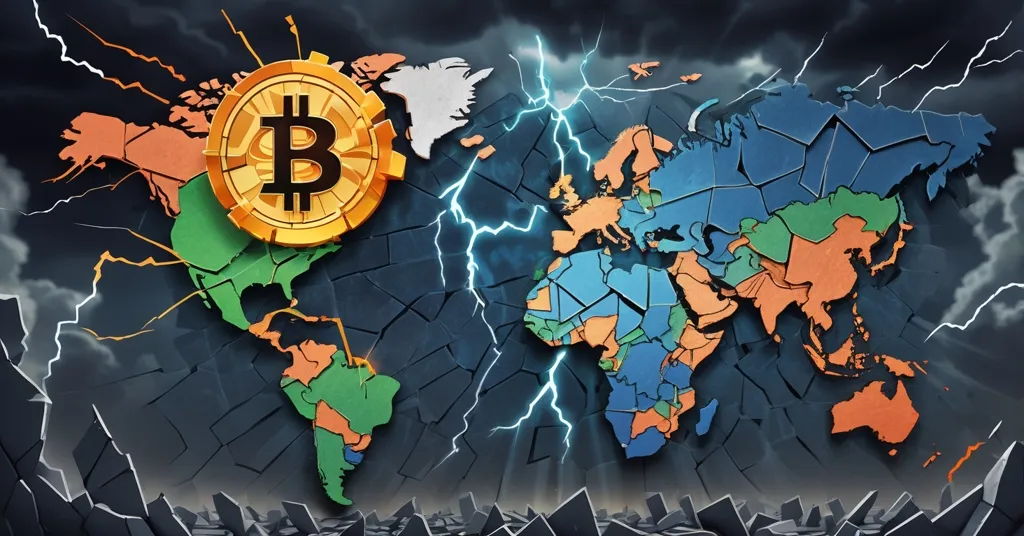BRICS Summit 2025: Xi, Putin Skip Event as Russia’s Crisis Fuels Bitcoin Buzz

BRICS Summit 2025: Xi and Putin Absent as Russia’s Crisis Sparks Bitcoin Potential
The BRICS summit in Rio de Janeiro, kicking off on July 6, 2025, was meant to be a powerful display of unity among emerging economies. Yet, the glaring absence of China’s Xi Jinping and Russia’s Vladimir Putin stole the spotlight, raising serious questions about the bloc’s cohesion and its ability to challenge Western financial dominance. Hosted by Brazilian President Luiz Inacio Lula da Silva, this event exposed cracks in the alliance at a time when global economic tensions are running high—and for us in the crypto space, it’s a stark reminder of why decentralized systems like Bitcoin might just be the future.
- Leadership Void: Xi Jinping and Vladimir Putin skipped the summit with no explanations, joined remotely or by lesser representatives.
- Russia’s Collapse: A crumbling economy with shrinking GDP and soaring military costs likely kept Putin away.
- Crypto Opportunity: BRICS disunity and Russia’s crisis amplify the case for Bitcoin and blockchain solutions in sanctioned economies.
Summit Snub: A Visible Fracture in BRICS
Against the breathtaking backdrop of Sugarloaf Mountain, the BRICS family photo looked more like a half-empty reunion. Leaders like India’s Narendra Modi and South Africa’s Cyril Ramaphosa stood tall, but the absence of heavyweights from China, Russia, Egypt, Iran, and Saudi Arabia was impossible to ignore. Russia sent Foreign Minister Sergey Lavrov, while China delegated to Li Qiang, Xi’s second-in-command. Putin did dial in via video link—likely dodging an International Criminal Court (ICC) arrest warrant that could’ve landed him in cuffs in Brazil, a signatory nation. Still, remote appearances don’t carry the same weight as shaking hands in person. Compared to past G20 summits where no-shows were glossed over, this event screamed disunity for a bloc that’s supposed to represent the Global South’s defiance against Western hegemony. For context on the purpose and history of BRICS, it’s worth noting its role as a counterweight to traditional power structures.
BRICS—originally Brazil, Russia, India, China, and South Africa—has expanded since 2024 to include nations like Egypt, UAE, Ethiopia, and Iran, aiming to counterbalance U.S.-led financial systems through initiatives like de-dollarization (reducing reliance on the U.S. dollar for global trade). The absence of key players at such a critical moment undercuts that mission. So, what’s keeping these leaders away? Let’s break it down, starting with Russia, where the economic situation is nothing short of a disaster. Discussions around the impact of this crisis on the summit highlight growing concerns among observers.
Russia’s Economic Freefall: A Perfect Storm
Russia’s economy is a crumbling fortress, barely holding under the weight of war and sanctions, which likely explains Putin’s focus inward. The numbers are brutal: GDP growth slowed to a measly 1.4% in Q1 2025, down from 4.5% in the prior quarter—a sign the economy is stagnating, threatening jobs and livelihoods. Manufacturing is in its sharpest decline in over three years, new car sales tanked 30% year-over-year in June 2025, and consumer spending is drying up as inflation rages. The central bank cut its key rate in June to 21%, with another slash expected, but it’s barely a band-aid. Insights into this sharp economic slowdown reveal the depth of the challenges. Russia’s Economy Minister Maxim Reshetnikov didn’t sugarcoat it:
“The country is on the verge of a recession.”
Finance Minister Anton Siluanov doubled down, calling it a:
“perfect storm.”
Even Putin, who rarely admits weakness, felt the heat while trying to spin optimism:
“Reports of its death are greatly exaggerated… recession or stagflation should not be allowed under any circumstances.”
Zooming into the industrial carnage, Rostselmash, Russia’s top tractor manufacturer, slashed production and forced 15,000 workers into early leave as demand evaporated. Rosseti Sibir, a major Siberian electricity provider, is on the brink of bankruptcy, freezing investments and pleading for higher tariffs. Then there’s the war-driven budget bleed—military and security spending for 2025 is projected at a staggering 40% of government funds, over 6% of GDP, the highest since Soviet days. Compare that to 3% in the U.S. or 2% in Germany, and you’ve got a nation prioritizing tanks over bread. Oil and gas, which make up a third of national income, hit their lowest revenue since January 2023 in June 2025 due to weak global prices. Add to that a looming banking crisis by 2026, with forced war-related loans at unsustainable rates risking defaults, and state bailouts seem inevitable, per warnings from the Center for Macroeconomic Analysis and Short-Term Forecasting.
This isn’t just a domestic mess—it’s a geopolitical signal. If your house is on fire, you don’t jet off to Rio for photo ops. But could this chaos push Russia toward decentralized lifelines like Bitcoin? Hold that thought—we’ll get there. Reports on Russia’s potential pivot to Bitcoin amid these struggles are already circulating.
China’s No-Show: Strategic Move or Silent Drift?
Xi Jinping skipping the summit—his first absence in over a decade—raises equally big questions. Unlike Putin’s clear ICC constraint, China offered no official reason. Some point to domestic economic headwinds, including trade spats with the U.S. under Trump’s tariff-heavy regime, or preparations for a major political conclave in 2025. Others wonder if it hints at a cooling in the China-Russia alliance, despite Beijing’s support via discounted oil purchases and critical goods amid Western sanctions. Experts push back on the snub narrative. Chong Ja Ian, an associate professor at the National University of Singapore, argues China still sees BRICS as a vital counter to U.S. influence, suggesting Xi’s absence is tactical, tied to lower expectations for summit breakthroughs. Brian Wong from the University of Hong Kong adds that Li Qiang likely advanced China’s agenda in Rio, including energy deals with oil-rich BRICS members and expanding the digital yuan—a state-backed digital currency on a blockchain—for trade. The unexplained absence of both leaders has fueled speculation about underlying tensions.
Still, the optics bite hard. When your biggest player doesn’t show, it dents the bloc’s image as a united front. And with China pushing its digital yuan, a centralized tool starkly opposite to Bitcoin’s ethos, it’s worth asking: could BRICS’ financial rebellion lean on true decentralization, or just swap one master for another? Further analysis on the reasons behind Xi and Putin’s absence sheds light on these dynamics.
De-Dollarization and Decentralization: Crypto’s Big Moment?
Here’s where it gets juicy for us crypto nerds. BRICS has long championed de-dollarization, seeking alternative payment systems to bypass U.S. financial control. Russia’s economic tailspin and the visible cracks in BRICS unity at Rio scream opportunity for blockchain solutions and Bitcoin adoption. Let’s unpack this. If your currency is tanking under inflation and sanctions—as Russia’s ruble is—why not hedge with Bitcoin, a decentralized, borderless store of value that no government can seize or devalue overnight? It runs on a network no single entity controls, making it a potential lifeline for individuals or even states in crisis. Perspectives on Bitcoin’s role in de-dollarization efforts highlight its growing relevance in such scenarios.
Russia’s already got skin in the game. With vast energy reserves despite oil revenue drops, the country has flirted with Bitcoin mining, legalizing it in certain regions by 2023 to leverage cheap power in places like Siberia. Could a collapsing economy accelerate this pivot as an alternative income stream? Meanwhile, cross-border trade within BRICS could use blockchain—think permissionless ledgers where transactions settle without political friction or ICC warrants getting in the way. If Putin can’t set foot in Brazil without risking arrest, maybe a trustless system is the diplomacy of tomorrow.
China’s angle is different but relevant. Its digital yuan, a central bank digital currency (CBDC), uses blockchain tech but prioritizes state control over privacy—think total surveillance of every transaction, the antithesis of Bitcoin’s freedom-first approach. Brian Wong notes China wants BRICS nations trading in this digital currency, reducing dollar reliance. But for nations wary of Beijing’s oversight, decentralized finance (DeFi) protocols on networks like Ethereum could offer neutral ground, handling trade or remittances without bowing to any capital. Look at Venezuela or Iran—both have used crypto to skirt sanctions, with Bitcoin transaction volumes spiking during economic crises per Chainalysis data. Russia could follow suit if desperation kicks in. Academic discussions on blockchain solutions for de-dollarization in BRICS provide deeper insights into these possibilities.
Challenges Ahead: State Control vs. True Freedom
Let’s not get carried away with digital utopia fantasies. There’s a dark side to this potential crypto boom in BRICS. Russia’s iron-fisted regime means any Bitcoin pivot might be state-orchestrated, not a libertarian free-for-all. Imagine centralized mining farms funneling profits to the Kremlin—hardly the disruption we root for. China’s digital yuan is already a privacy nightmare; widespread adoption in BRICS could lock member nations into a surveillance grid, not liberation. And let’s talk volatility—Bitcoin’s wild price swings make it a risky bet for economies already on the edge. A 20% drop in a week (not uncommon) could gut savings faster than inflation. Then there’s regulation. China’s past crypto bans show how quickly states can crush decentralized dreams if they threaten control.
Even BRICS’ disunity poses a hurdle. If leaders can’t align on summits, good luck coordinating blockchain-based trade platforms or unified CBDC frameworks. Individual nations might experiment—Russia with mining, China with its digital yuan—but a cohesive, decentralized revolution feels like a long shot. Still, chaos breeds innovation. When centralized systems, be they economies or alliances, falter as spectacularly as Russia’s is now, the case for Bitcoin and blockchain only sharpens. We’re not just talking tech; we’re talking a rapid, disruptive bypass of outdated financial rails—effective accelerationism in action.
Key Takeaways and Big Questions
- Why did Xi Jinping and Vladimir Putin skip the BRICS summit?
No official reasons surfaced; Putin’s ICC arrest warrant risk forced a video link appearance, while Xi likely prioritized domestic economic and political challenges over a symbolic event. - What does this mean for BRICS’ challenge to Western finance?
It signals weakness and disunity, potentially stalling efforts like de-dollarization that could otherwise spur blockchain or CBDC adoption among member states. - How dire is Russia’s economic crisis, and can Bitcoin help?
It’s catastrophic—GDP at 1.4%, industries collapsing, and 40% of budget on war; Bitcoin could serve as a hedge for citizens against inflation and sanctions, though state control looms as a risk. - Could blockchain solve BRICS’ trust and coordination issues?
Partially—decentralized ledgers could enable frictionless trade despite political rifts, but centralized tendencies in nations like China and Russia might limit true freedom. - Is BRICS the future of crypto innovation, or a false hope?
It’s a cautious bet; de-dollarization aligns with crypto’s ethos, but fractured leadership and state-driven alternatives like CBDCs could overshadow Bitcoin’s decentralized promise.
The BRICS summit’s missing titans aren’t just a diplomatic misstep—they’re a glaring symptom of deeper fractures. Russia’s economy is imploding under war and isolation, while China’s priorities seem to drift. For those of us championing decentralization, this mess is a neon sign: centralized systems are fragile as hell. Bitcoin and blockchain aren’t mere experiments; they’re potential lifelines in a world where trust—between nations or in fiat—is in short supply. But adoption won’t be a clean sprint, especially with state actors itching to twist crypto into their own controlled toys. So, if global alliances keep stumbling under political baggage, is Bitcoin the ultimate neutral ground, or just a shiny mirage? Chew on that while the old guard scrambles to hold power.



